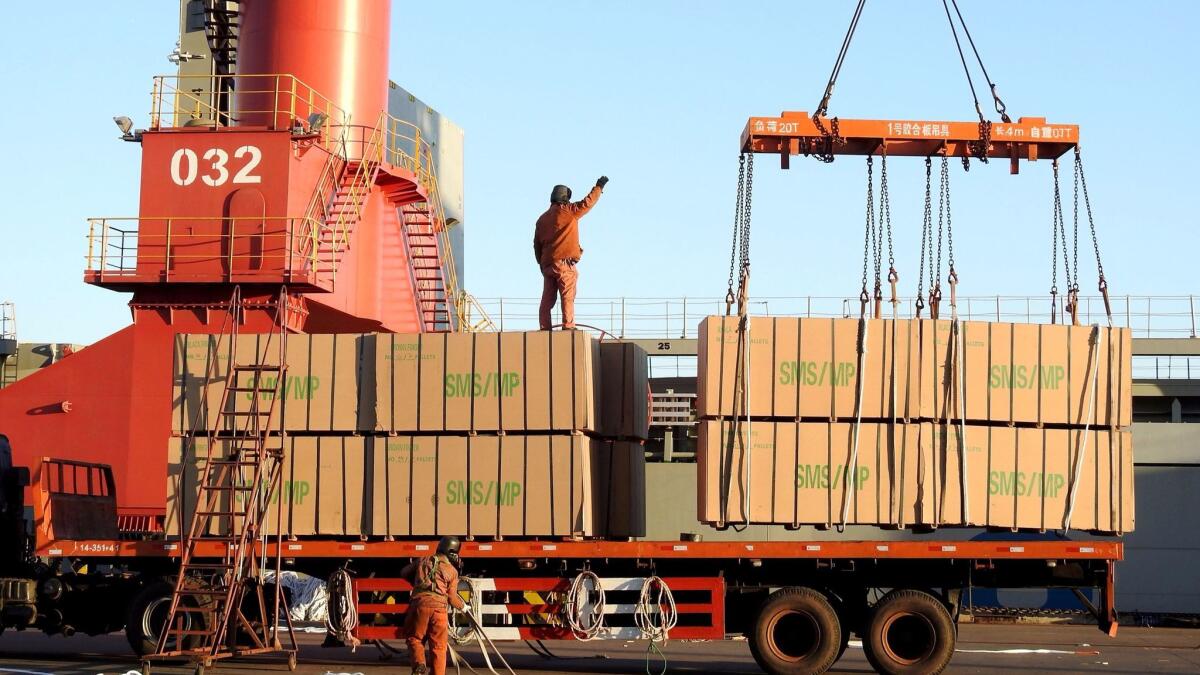In Asia, China looks like the winner after scuttling of Trans-Pacific Partnership

Reporting from Beijing â Donald Trump the candidate denounced Chinaâs trade policies. But one of his first acts as president handed the country its best chance yet to rival the U.S. as global economic leader.
Trump on Monday officially scrapped the Trans-Pacific Partnership, a pen stroke that reversed his predecessorâs push toward Asia and dashed the last-minute hopes of Pacific Rim member nations trying to resist Chinaâs gravitational pull.
The move delighted Beijing, which no longer needs to worry about a U.S.-led deal Chinese officials saw as an attempt to undermine its rise. These leaders now have a rare opportunity to tilt the geopolitical landscape and promote an agenda more aligned with Chinaâs goals for global trade.
âIf China is required to play that leadership role, then China will assume its responsibilities,â Zhang Jun, head of the Chinese Foreign Ministryâs international economic affairs department, told reporters on Monday.
The 12-member TPP, which stretched from Japan to Peru but did not include China, aimed to create a free-trade zone for about 40% of the worldâs economy. It would have cut tariffs and set rules for trade disputes, the environment and intellectual property. The Obama administration viewed it as key strategy to expanding U.S. influence in the region.
Trump has long criticized international trade agreements and said his executive action would protect American workers from low-wage countries like Vietnam and Malaysia, two other members of the accord.
The TPP âcame hand in hand with a vision about what the world order looked like,â said Danny Quah, an economics professor at the Lee Kuan Yew School of Public Policy in Singapore. âIt had to do with America being in the center writing the rules of the game that benefit everyone.â
Nothing revealed the diverging attitudes clearer than two speeches last week â Trumpâs inaugural address and Chinese President Xi Jinpingâs keynote at the World Economic Forum in Davos, Switzerland. While Xi advocated free trade, Trump embraced protectionism.
Europe is distracted by its own wave of populism, leaving few major economies to fill the void.
âWithout China or America, Asia-Pacific countries would create their own various trade deals, which would be a total mess,â said Wang Huiyao, president of the Center for China and Globalization, a Beijing think tank.
But Xiâs China is also one where civil rights lawyers are jailed for speaking out and regulations make it nearly impossible for foreign businesses to compete. Officials on Monday announced a crackdown on virtual private networks that allow Internet users to circumvent the countryâs censorship system.
Critics fear the communist country will determine new global roles that arenât in the interests of the U.S. or its allies, such as deals without human rights assurance or worker protections.
Failure to move forward on initiatives like the TPP âwould create a void that China is all too happy to fill, and one that would leave our closest military allies and partners no choice but to line up behind China,â former U.S. Trade Representative Michael Froman said in a speech this month just before leaving office.
The TPP had appeal among leaders from Tokyo to Hanoi because it helped keep China at armâs distance. Japanâs parliament ratified the TPP agreement last week, a largely symbolic show for a dead treaty â at least one with U.S. participation. Vietnamese Prime Minister Nguyen Xuan Phuc even this month held out hope that Trump would reconsider his pledge to pull out of the deal.
Analysts considered Vietnam â which has leaped from one of the worldâs poorest countries to one of its fastest-growing economies â to be among the TPPâs biggest potential winners.
Now the Southeast Asian nation has little choice but to turn to its northern neighbor, its largest trading partner with which it also shares a fraught relationship. Territorial disputes in the South China Sea have stoked further tension between the two countries. When asked about their greatest concerns, many Vietnamese answer in one word: China.
âPeople worry about the vacuum, that thereâs some space left behind with the new administration that will be filled by China,â said Vu Thanh Tu Anh, director of research at the Fulbright Economics Teaching Program in Ho Chi Minh City.
Vietnam and Malaysia are now looking to a China-backed trade deal with 16 Asia-Pacific states known as the Regional Comprehensive Economic Partnership. Australiaâs prime minister said Tuesday the country would try to salvage the TPP without the U.S. and that China might be able to join a revamped accord.
China continues to develop a trade path along the ancient Silk Road, an effort to expand influence westward. The country also supports a free trade area in the Asia-Pacific.
âIf we focus on RCEP we will not face any major loss in the faceâ of the TPPâs collapse, said Datuk Ahmad Maslan, Malaysiaâs deputy minister of international trade and industry, according to the countryâs official Bernama news agency.
Such countries, at least for now, have few other options.
âIf you are an [Asian] economy facing slower growth, where do you go?â said Malcolm Cook, a senior fellow at the ISEAS-Yusof Ishak Institute in Singapore.
âChina seems to be the only one in the game.â
Meyers is a special correspondent.
Twitter: @jessicameyers
Yingzhi Ying and Nicole Liu in the Timesâ Beijing bureau contributed to this report.
ALSO
What Trumpâs orders on trade, abortion and federal hiring really do â and donât do
With Trump in the White House, Israel moves aggressively to build on disputed land
A terrorist attack in Germany could have hurt Angela Merkel politically. So far, it hasnât
More to Read
Sign up for Essential California
The most important California stories and recommendations in your inbox every morning.
You may occasionally receive promotional content from the Los Angeles Times.










